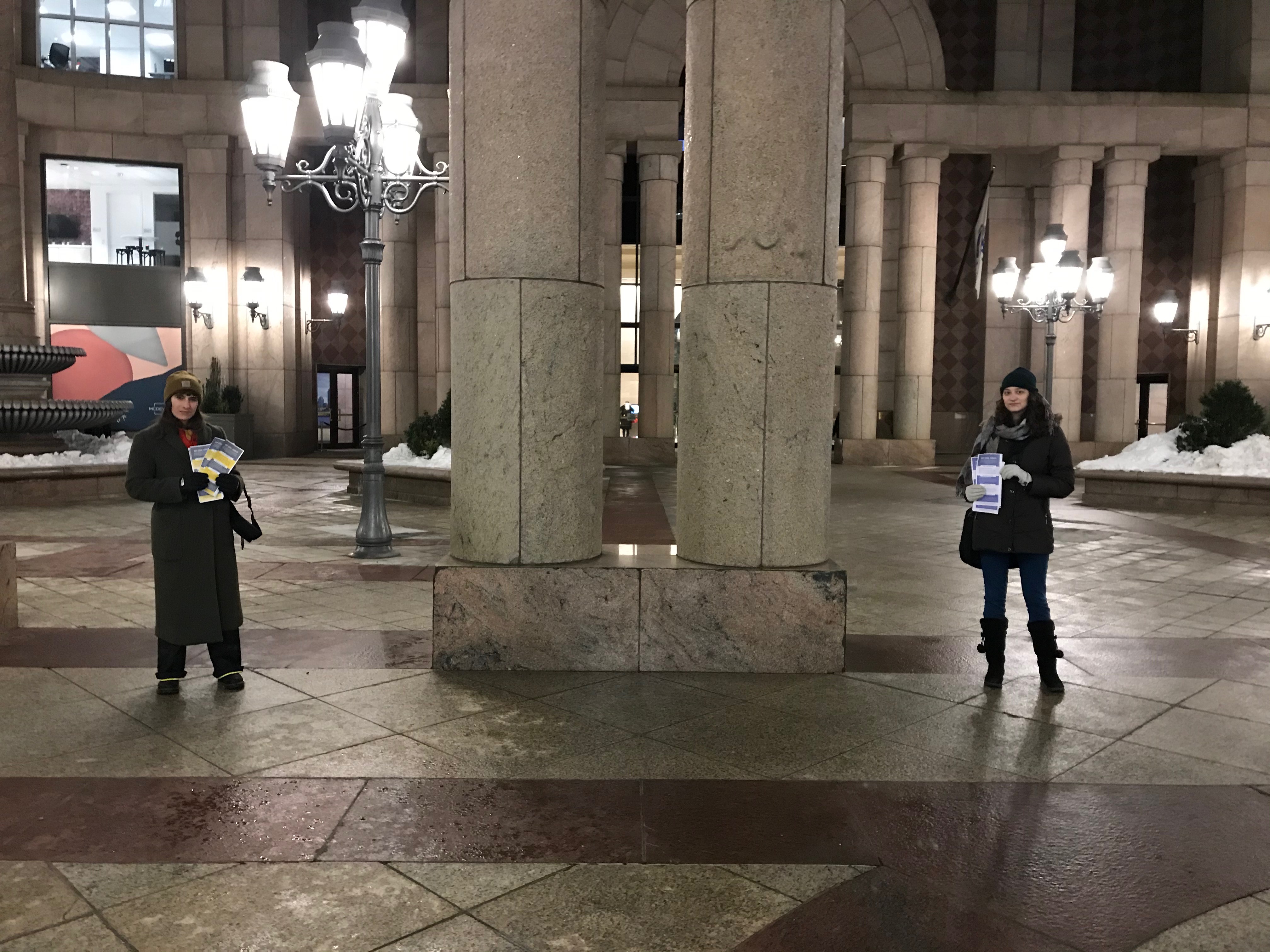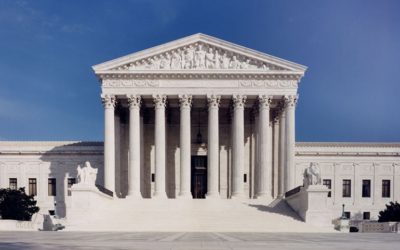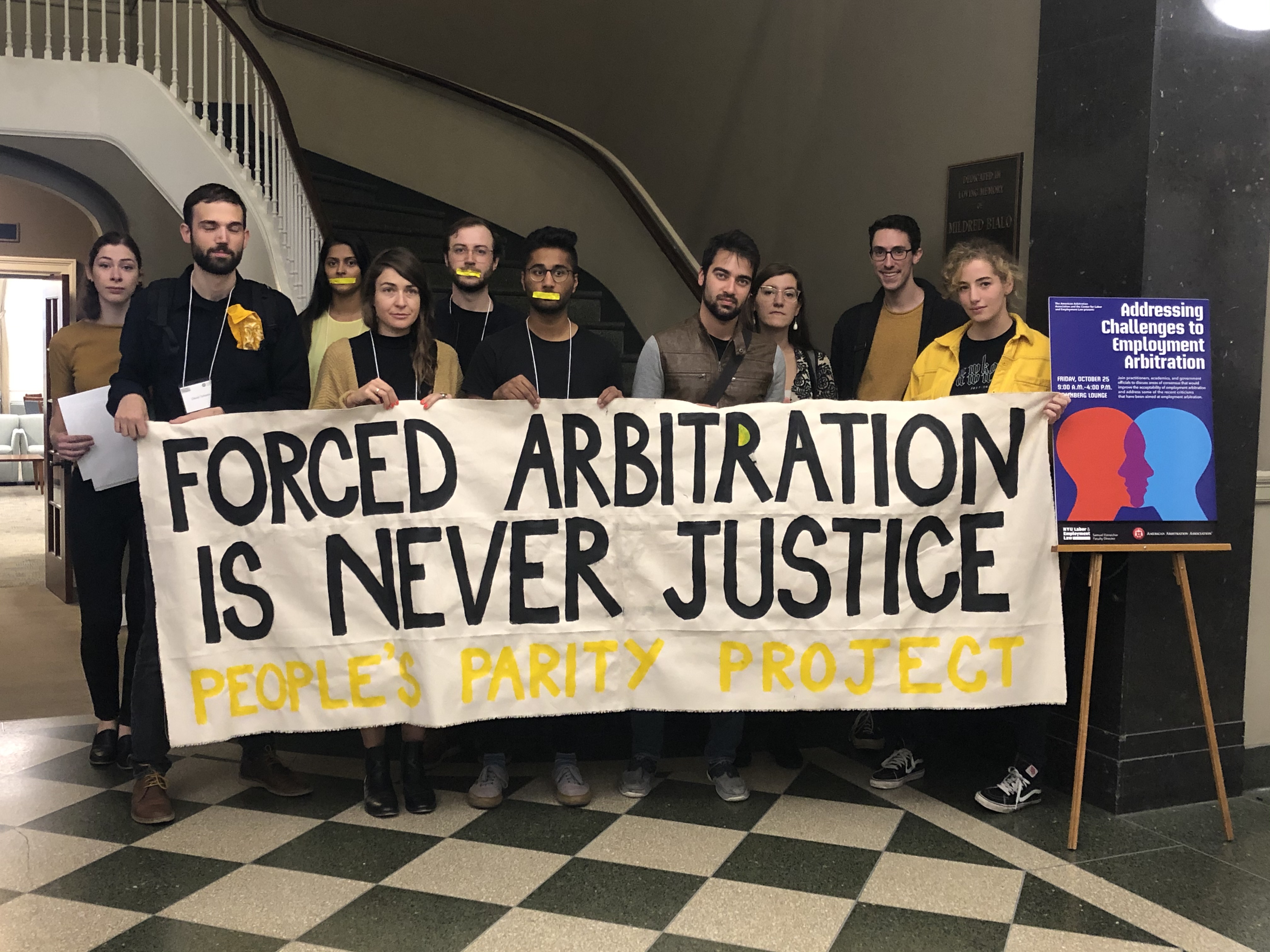OUR APPROACH
After a half century of work, the conservative legal project has paid off: our legal system almost exclusively serves corporate power and the interests of the far-right. At every turn, the legal system seems to thwart the collective power of everyday people.
We know that the legal profession is at the root of the problem, and thus it must also be at the core of the solution.
At PPP, we aim to make clear that the practice of law is inherently political. When you enter the profession you choose a side. You can be on the side of the pro-corporate forces fighting against progress, or you can be on the side of the people.
We equip our organizers to choose the side of the people, and develop and execute campaigns to build a better legal system. Our organizers support the nominations of pro-people state court judges; hold lawyers accountable for deploying coercive contracts in service of corporate power; work to open the courthouse doors to working people; campaign to ease the financial barriers for students who pursue pro-people legal careers; and more.
By successfully engaging organizers in these campaigns, we achieve three things:
1.) There are meaningful and immediate changes made to how the legal system works.
2.) The relationships formed through this work empower organizers to question the dominant norms of the legal academy and profession and stay on a pro-people career path.
3.) Organizers learn to see their role as lawyers as part of a larger fight for justice. They understand how to effectively use their legal knowledge and skills in solidarity with and in service of the broader community.
In this way, we are doing the long-term organizing work needed to achieve our ultimate goal: a legal system that works for working people, not corporate America.
ready to unf*ck the law?
Doing the work of unrigging our legal system is going to take a true movement for change within the legal profession. Are you ready to be part of it?
OUR PRIORITIES
WORKER POWER
When pro-corporate forces run our legal system, working people are left to pay the price. Because the consequences of our rigged legal system fall most heavily on working people, our we center worker power as a core tenant of our efforts.
PPP has been fighting coercive contract terms, like forced arbitration clauses and non-compete “agreements” since our founding. Our campaigns have led to thousands of workers being freed from forced arbitration clauses, helped build momentum for passage of the Forced Arbitration Injustice Repeal Act, and raised awareness about the role lawyers play in using the fine print of contracts to harm workers and consumers.
Through our chapters, we’re building communities that fight the corporate capture of the legal profession. Too often, law students and young attorneys are told that regardless of their values, Big Law is the best place to start their career. By exposing law students to economic justice lawyers, particularly in the plaintiffs’ bar, supporting campaigns to make this work more accessible (e.g., improving loan forgiveness options and creating more accessible information about pro-worker and pro-consumer lawyering), and raising awareness about the harm caused by corporate lawyers, we’re ensuring that law students who enter law school wanting to fight for economic justice leave doing that work.
FEDERAL JUDGES
We work to ensure that as many pro-people lawyers become judges as possible. This began with changing the public conversation, setting the standard for what a progressive judicial nominee looks like.
We’re proud to have worked with and supported multiple fantastic lawyers who have successfully been nominated and confirmed to the federal bench.
We’re equally proud to continue to hold the Biden administration accountable for putting pro-people judges on the bench, advocating for more pro-people judges at every turn.
As we work to ensure there are more pro-people judges on the bench, we are changing what justice looks like in the short term. Equally importantly, we are changing the culture of the legal profession to one in which law students and young attorneys recognize that a career in public interest will open—not close—doors.
STATE COURTS
The vast majority of individuals who interact with the legal system will do so through the state court system. And for as long as the federal judiciary remains in the control of far-right reactionaries with too much power, state courts will seem to be a more viable path for litigation that advances the rights of the American people.
However, without adequate democratic engagement, these courts are also at risk of experiencing a crisis of legitimacy and being fully captured by the same forces that have taken control of the federal courts. We recognize that we must increase the public’s oversight of these courts, in order to ensure that state judiciaries are accountable to the people.
At PPP, we’re taking a four-pronged approach to building this democratic engagement with state courts nationwide:
1. Raising awareness about what state courts are, what they’re doing, and why it matters.
2. Building a pipeline of pro-people law students and lawyers who see service on the bench as a plausible path for a to pursue, and who have the training, network, and other support necessary to do so.
3. Supporting on-the-ground campaigns for judicial accountability. We work with our organizers and other allies to hold accountable pro-corporate and pro-carceral judges and judicial candidates, and to build community-led movements to push for a better vision of justice.
4. Working with the Center for Community Alternatives, we’ve built the State Courts Organizing Network, which unites grassroots organizations and activists nationwide to influence judicial selection and shift judicial decision-making at the local level. Through this network, we’re building a community of grassroots leaders who can share best practices and resources, learn from one another, and collaborate to build stronger state courts across the country.
FEDERAL COURT REFORM
The federal judiciary, led by the Supreme Court, is the most significant barrier to progress that we face. Regardless of how much is achieved by Congress and the President, the Supreme Court stands to strike it down, narrow it, or otherwise prevent the American people from reaping the benefits their elected officials won.
In the short-term, there are key things that can be done to ameliorate this risk. This includes nominating and confirming pro-people judges and expanding the size of the Supreme Court in order to restore balance after years of illegitimate power grabs by the far right.
However, this alone is not enough. The Supreme Court is a fundamentally reactionary institution. It lacks democratic legitimacy, and its record makes clear the consequences of concentrating immense power in the hands of unelected, unaccountable elites. We’re fighting to wrestle back power from the federal judiciary—principally the Supreme Court—and put it in the hands of democratically accountable actors, where it belongs.
To do this, we’re taking on three key roles in the effort to disempower the courts:
1. Bringing people together to build workable strategies to disempower the justiciary, prioritizing those that have the potential to have popular support amongst both leaders and the grassroots.
2. Playing a critical thought leadership role, ensuring that the power of the courts—the power it has now, and the questions as to what power it should have in the future—is at the center of every conversation about the progressive project.
3. Building a movement, in partnership with allies and our organizing base, to fight for concrete power-shifting reforms that put power back in the hands of the branches of government with true democratic legitimacy.
Through this work, we aim to alleviate harm in the short term while working with progressive allies and people around the country so that we don’t find ourselves confronting a rogue, anti-democracy court every few decades.
The latest
People’s Parity Project Submits Written Testimony to the House Judiciary Committee Calling for Increased Protections for Judicial Employees
Spurred by recent news of yet another federal judge who has been reprimanded for harassment, the House Judiciary Committee is holding a hearing today to address sexual harassment in clerkships and the judiciary’s continued failure to stop it. The 10th Circuit has been...
Consumer Rights Activists Target Grindr’s New Forced Arbitration Agreement
Activists argue that a forced arbitration clause buried deep in Grindr’s new Terms of Service will give the company a free pass for violating users’ rights; urge users to opt-out.
Are You on Grindr? Know Your Rights and Opt Out of Forced Arbitration
If you joined Grindr before 2020, you only have until Wednesday, January 29, to opt out of the forced arbitration clause. New users have 30 days from when they accepted the Terms of Service to opt out. WHY SHOULD I OPT OUT? These new terms take away your right to sue...
Law Students Leaflet to Say: “Not Cool, Cooley”
On Tuesday, January 21, Cooley LLP held a recruiting event for law students in the Boston area called “Planning Ahead: Tips for Surviving Fall Recruiting and a Preview of Law Firm Life.” But the People’s Parity Project showed up to make sure that prospective...
NALP Agrees to Help Lift the Shroud on Firms’ Forced Arbitration Policies
In March, the People’s Parity Project started a petition to the National Association of Law Placement, a group representing legal employers, to include information about forced arbitration in its Directory of Legal Employers. NALP’s directory features comprehensive...
Democrats Must Prioritize the Courts in November Debate
On November 20th, democratic candidates for President will share their visions for a post-Trump America. The candidates will surely discuss Medicare for All, climate change, and the urgent need for gun control. The all-female panel of moderators will hopefully ask...
Bloomberg Law: LGBTQ Students Refuse Funds From Law Firms With Arbitration
Stephanie Russell-Kraft wrote for Bloomberg Law: A group of 14 LGBTQ affinity groups from top law schools, including Harvard, Stanford, and Yale, will no longer accept funds from law firms that require employees to sign arbitration agreements. The affinity groups were...
LGBTQ+ Law Students Lead by Taking Action Against Forced Arbitration
14 LGBTQ+ Law Students’ Groups at Top Law Schools Announce That They Will Refuse to Accept Donations From or Promote Firms That Require Employees to Sign Away the Right to Sue as a Condition of Employment Cambridge, MA — LGBTQ+ student organizations from law schools...
NALP Says Nope to Our Petition—But Our Fight’s Not Over
Earlier this year, we started a petition asking the National Association of Law Placement (NALP) to include information about which law firms subject their employees to forced arbitration in its directory of legal employers. This is vital to ensuring that law...
People’s Parity Project Protests Employment Arbitration Conference, Calls for an End to Forced Arbitration
Law students at NYU School of Law met conference attendees with taped mouths and banners as PPP organizers continue to push for an end to all pre-dispute, binding arbitration. New York, NY — Two weeks after law students led multi-city protests against forced...









